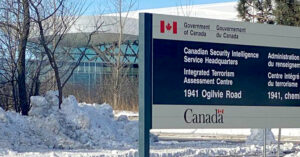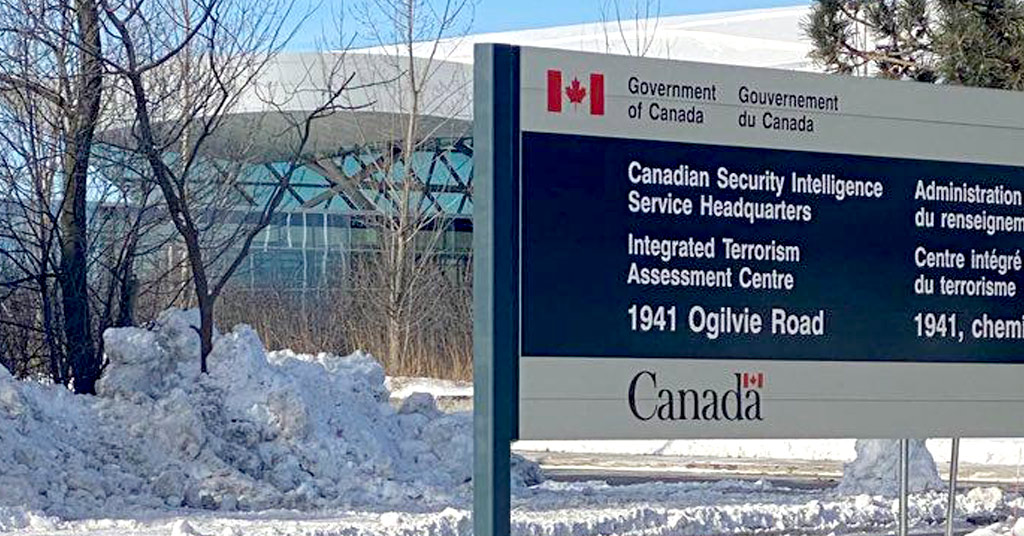
CSIS Investigating Southwestern Ontario Conservative Nomination Vote, Conservative Sources Say
Conservative Party denies knowledge of CSIS investigation involving a chaotic nomination battle in Oxford County, Ontario
Paranoia and confusion is running through conservative circles in Southwestern Ontario as word spreads that Canada’s spy agency is asking questions about India and a local Conservative nomination vote last year.
Conservative MP Arpan Khanna has represented Oxford since a byelection last summer, which followed a chaotic nomination battle earlier that year. Khanna is a well-connected former Jason Kenney staffer and also served as Ontario co-chair of Pierre Poilievre’s leadership campaign.
Khanna, who tried but failed to win a seat in Brampton in 2019, continues to be a subject of gossip in local Conservative circles, aspersions the Conservative MP has attributed to bitter internal political rivalries and racism.
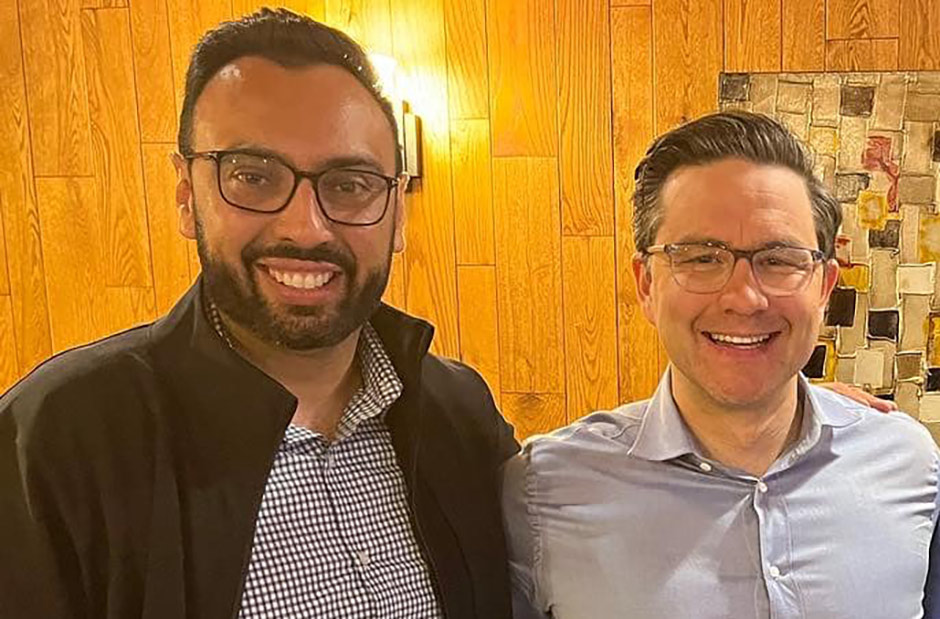
Arpan Khanna and Pierre Poilievre (Arpan Khanna, Facebook)
Multiple Conservative sources told PressProgress they had heard whispers of some kind of investigation involving the Canadian Security Intelligence Service and the Conservative Party of Canada’s 2023 nomination vote in Oxford.
While it remains unclear what sparked CSIS’ interest in the nomination, one person has shown evidence they were visited by CSIS agents who asked questions about the vote.
The source, who has deep ties to the Conservative Party and requested anonymity for fear of retribution, confirmed to PressProgress they were contacted by CSIS agents last year in regards to an investigation relating to the Conservative nomination race in Oxford.
“When they called me, they knew that (something) had gone on with the nomination process,” the Conservative told PressProgress, adding that the agents’ line of questions left them with the impression CSIS believed some “monkey business” had occurred.
They said two plain clothes CSIS agents later visited their home and asked questions focused on Khanna and specifically why the party establishment backed his nomination.
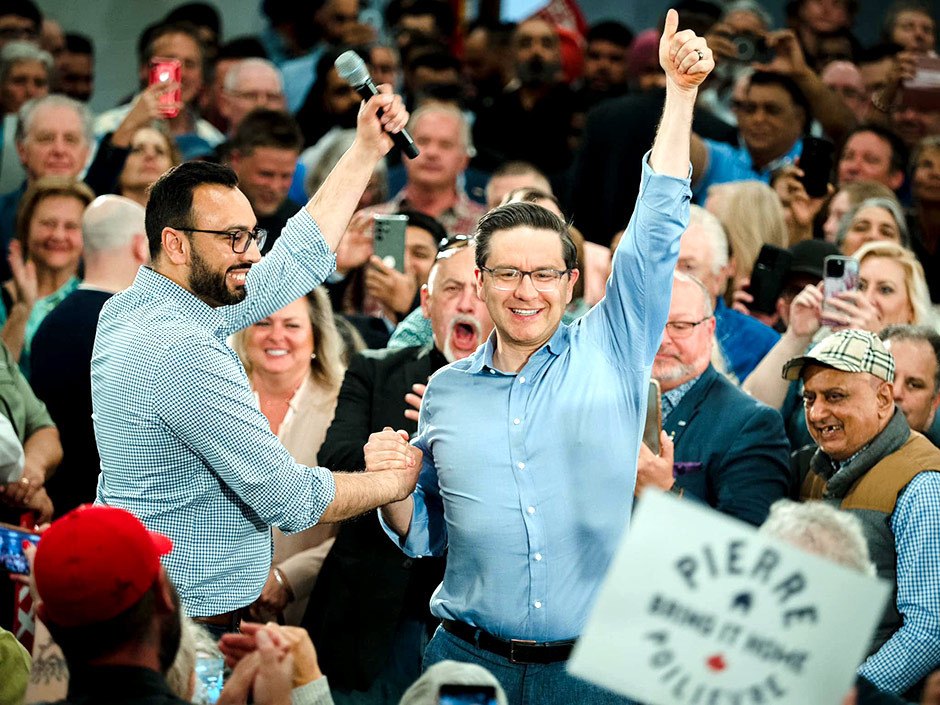
Arpan Khanna and Pierre Poilievre at May 2023 Oxford rally (Arpan Khanna, Facebook)
“Their question was ‘why Arpan?’ And did I know of any connection between Oxford county and India?” the Conservative said. “They asked if I knew what the connection with Oxford was to India, to which I said: ‘Nothing, it is a safe conservative riding’.”
“I explained what went on with the nomination,” the Conservative added. “They just basically gave the indication that they came down because the whole thing seems suspicious.”
“When I think back on the conversation, I think they just wanted to know what information I had.”
While they suspect party insiders interfered in the Oxford Conservative nomination, they said they had no knowledge of foreign interference, nor did the agents disclose their specific reasons for asking questions about Khanna, India or the Oxford Conservative nomination vote.
The Conservative shared a plain white business card featuring the spy agency’s embossed logo along with the name and contact information of the CSIS agent who visited them.
The person who answered the phone number listed on the business card confirmed their name was the same name as the CSIS agent printed on the CSIS business card.
Without being told the purpose of the call, they asked: “This is in regards to Arpan Khanna?”
Told they were speaking to a journalist and asked directly if they worked for CSIS, they said they could “neither confirm or deny” who they worked for.
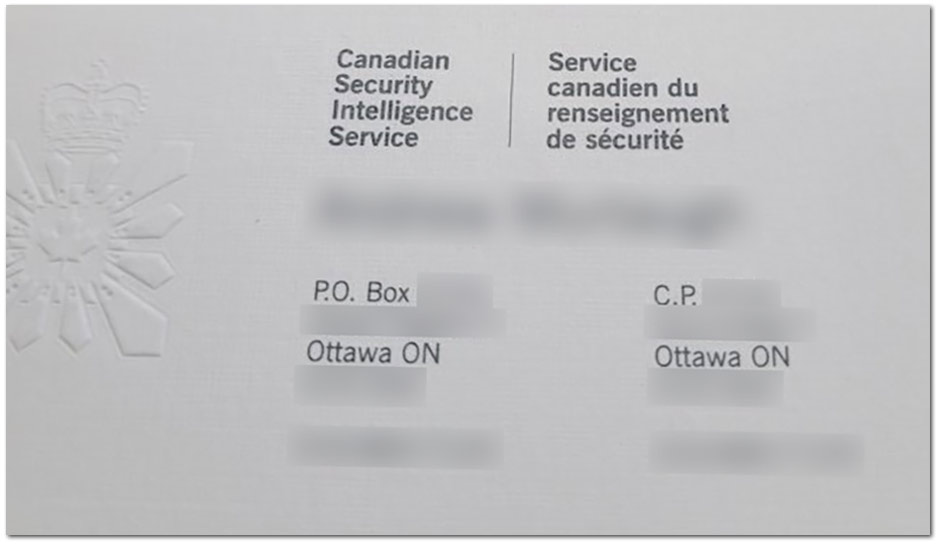
CSIS business card
The Canadian Security Intelligence Service said it is “unable to confirm or deny” that the graphic design or general appearance of the business card is consistent with official business cards used by the agency.
“For reasons of privacy and employee safety, we also cannot confirm or deny the identity of any current or former employee of the Canadian Security Intelligence Service,” a CSIS spokesperson told PressProgress.
The spokesperson also said that in order to “protect sensitive activities, techniques, methods and sources of intelligence,” CSIS is unable to comment on “the possible existence or non-existence of a specific investigation.”
Speaking on background, one national security source confirmed to PressProgress that the business card produced by the source matches the appearance of official business cards issued to CSIS employees.
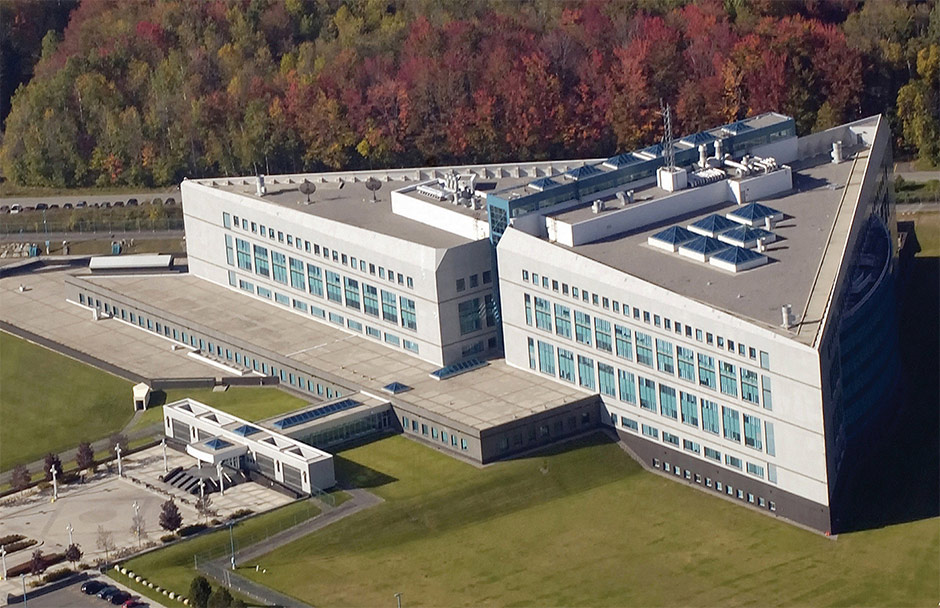
CSIS headquarters in Ottawa (CSIS, Twitter)
Local Conservatives aren’t the only ones left scratching their heads by the visit.
Michael Wilson, the Conservative Party of Canada’s legal counsel and a top field organizer for Poilievre’s 2022 leadership campaign, said in a letter to PressProgress that Khanna and the Conservative Party deny any knowledge of a “purported CSIS investigation” or “alleged irregularities during the 2023 Oxford nomination race.”
“Our clients are not aware of any such investigation or irregularities,” Wilson said.
“Mr. Khanna is a proud Canadian, and his allegiances rest firmly and solely with Canada. Mr. Khanna has previously worked for the Government of Canada, holding a high-level security clearance.”
“India is a country to which over one million Canadians have historical ties and that fact, on its own, is surely not a legitimate basis for the investigation of any of them by CSIS,” Wilson added.
A CSIS spokesperson said they could “confirm CSIS speaks with many Canadians on a variety of topics of importance to our national security.”
“When CSIS seeks cooperation or assistance from Canadians, we emphasize that discussions are voluntary,” the spokesperson told PressProgress. “CSIS ensures our approach is lawful, ethical and we are committed to protecting the confidentiality of everyone who engages with CSIS.”
The spokesperson added CSIS is actively monitoring “foreign interference” targeting Canadian democratic institutions, including individuals connected to party nomination races.
“Foreign interference involves foreign states such as the PRC, India or Russia attempting to covertly influence decisions, events or election outcomes to better suit their strategic interests. CSIS has observed foreign interference at all levels of government across Canada and across party lines targeting individuals in positions of potential influence.”
“In order to influence political outcomes, states may also exert pressure on communities, use covert funding or leverage foreign language media outlets,” CSIS noted. “Nomination processes are but one aspect of Canada’s democratic system that can be exploited to advance a foreign state’s interests.”
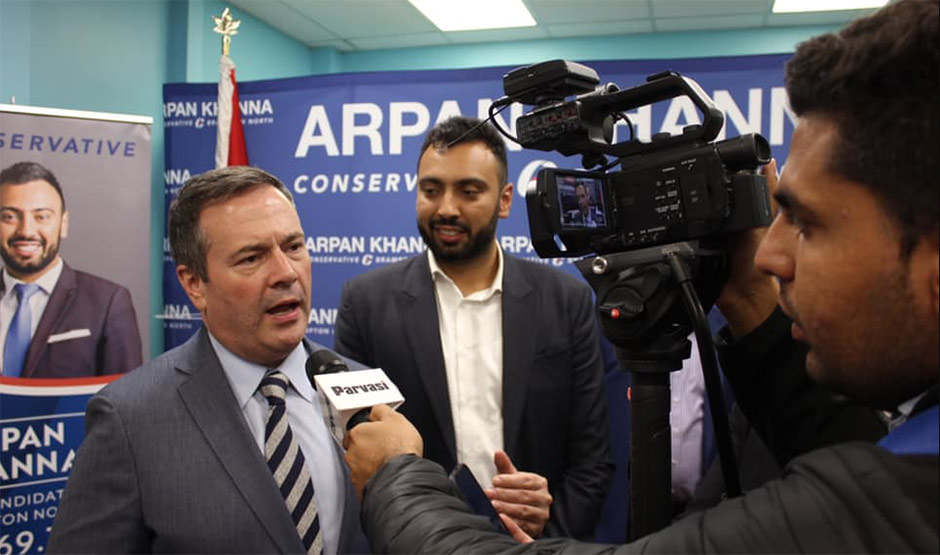
Jason Kenney and Arpan Khanna (Arpan Khanna, Facebook)
Dan Stanton, Director of the University of Ottawa’s National Security program and a former executive manager with CSIS, says a nomination race would not itself fall under CSIS’ jurisdiction, but investigating foreign interference would.
“They would never target an election or nomination race, as they are integral to our democratic fabric,” Stanton told PressProgress. “However, they would not hesitate to investigate an individual who is a threat to national security.”
Stanton said that for something to rise to the level of foreign interference, it would require a suspicion that “clandestine means” were used by a foreign state: “What foreign interference is, in section 2(b) of the CSIS Act, there has to be clandestine means that the foreign state is using to carry out their foreign policy.”
“It doesn’t matter whether it’s terrorism or espionage or foreign interference, they have to actually have a target of an investigation,” Stanton explained.
“If people are saying CSIS is going around interviewing people, it would be linked in some way to hostile activity in Canada,” Stanton said, adding that in general, CSIS could have received “some information somewhere – could be their own investigations, could be from a partner.”
“In order to assess that information and see if perhaps certain linkages to a foreign state are true, they have to interview other people, they have to sort of get a picture of it,” Stanton explained. “They’re not going to go out and just interview anybody.”
Khanna, in previous roles as a senior adviser to former Multiculturalism Minister Jason Kenney and a conservative organizer, developed contacts with Indian government officials and diaspora community groups in Canada.
According to Khanna’s LinkedIn profile, he “worked closely with Indian government officials” on Prime Minister Narenda Modi’s 2015 state visit to Canada.
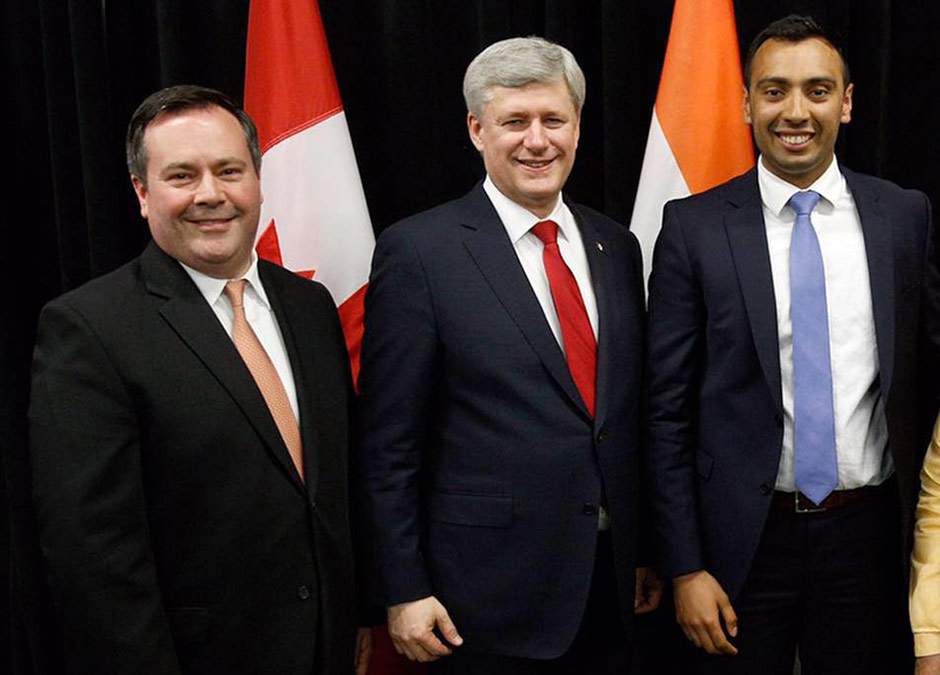
Jason Kenney, Stephen Harper, Arpan Khanna (Arpan Khanna, Facebook)
The contentious battle for the nomination in Oxford began when then-Conservative MP Dave MacKenzie retired in January 2023, ahead of the federal by-election.
During the race, a candidate backed by anti-abortion groups was disqualified by party officials. After Khanna later won the nomination, two Conservative riding association leaders in Oxford resigned, claiming that they felt the nomination race was unfairly skewed towards Khanna.
The nomination battle made headlines again last month when Conservative MP Andrew Scheer was fined for breaking parliamentary rules by using his office to film a video endorsing Khanna. Khanna’s campaign later filed a $500 expense paying for Scheer’s “pending penalty” from Elections Canada.
In a statement to PressProgress, Conservative Party of Canada legal counsel Michael Wilson responded that “grievances amongst those who did not win in Oxford are well-documented and publicized, with aspersions being cast by certain failed candidates.”
Stephanie Carvin, a Carleton University international affairs professor and a former CSIS intelligence analyst, says one reason CSIS could be investigating is because the spy agency has been under increased pressure to investigate threats of foreign interference.
“I do think that there is more pressure to investigate the espionage and foreign interference threats,” Carvin told PressProgress.
“For the first two decades after 9/11, the pressure was always on violent extremism and very particular kinds of violent extremism, but with all the revelations over the past year and a bit, there is definitely more pressure, I think, to get to the bottom of threats to democratic institutions – in this case, nomination processes.”
While Carvin is careful to note that “intelligence is not evidence,” she adds that CSIS has a duty to investigate any credible information of potential wrongdoing it may have received.
“If a source went to the service, and said it suggested that there may be some wrongdoing, here, the service would feel perhaps necessary to open an investigation to find out if something’s going on,” Carvin said. “So, what we know is that the service is investigating.”
“What the service needs to get to the bottom of is if there is actually something here and to do that, they need to talk to the people in the community.”
In 2019, CBC News reported CSIS had been approaching federal political parties to warn them of efforts by India and five other countries to interfere in Canadian elections, while more recent reporting has alleged Indian state actors interfered in an unnamed party’s leadership race.
“CSIS intelligence indicates that the Government of India has engaged in Foreign Interference activities related to the leadership race for a political party in Canada,” states an October 2022 CSIS intelligence assessment document obtained by The Bureau.
Despite this, Canada’s upcoming public inquiry into “foreign interference in federal electoral processes and democratic institutions” is mandated to “examine and assess interference by China, Russia and other foreign states,” but does not explicitly mention India by name.
In December, NDP MP Peter Julian called on the government to specifically include India in the upcoming public inquiry into foreign interference.
Our journalism is powered by readers like you.
We’re an award-winning non-profit news organization that covers topics like social and economic inequality, big business and labour, and right-wing extremism.
Help us build so we can bring to light stories that don’t get the attention they deserve from Canada’s big corporate media outlets.
Donate

